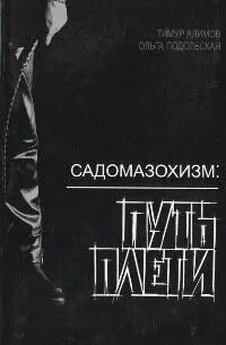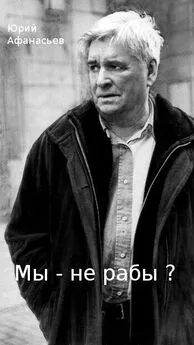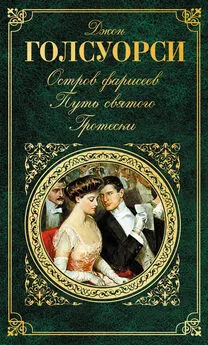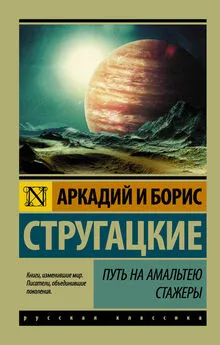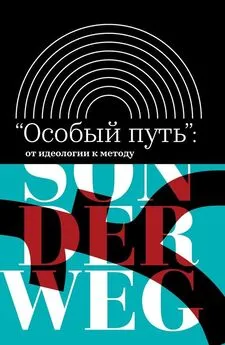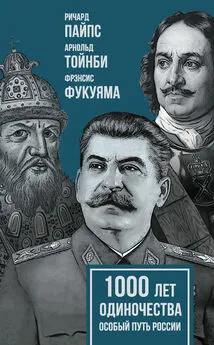Тимур Атнашев - «Особый путь»: от идеологии к методу [Сборник]
- Название:«Особый путь»: от идеологии к методу [Сборник]
- Автор:
- Жанр:
- Издательство:Новое литературное обозрение
- Год:2018
- Город:М.
- ISBN:978-5-4448-0888-7
- Рейтинг:
- Избранное:Добавить в избранное
-
Отзывы:
-
Ваша оценка:
Тимур Атнашев - «Особый путь»: от идеологии к методу [Сборник] краткое содержание
«Особый путь»: от идеологии к методу [Сборник] - читать онлайн бесплатно полную версию (весь текст целиком)
Интервал:
Закладка:
Пер. с англ. Александра Потемкина
[Anghelescu 2002] — Anghelescu M. Introducere // Rădulescu I. H. Opere: In 2 vols. / Ed. îngr., pref., note şi bibliogr. de M. Anghelescu. Vol. 1. Bucharest: Univers Enciclopedic, 2002. P. I–XXVII.
[Bach 1990] — Bach M. Die charismatischen Führerdiktaturen: Drittes Reich und italienischer Faschismus im Vergleich ihrer Herrschaftsstrukturen. Baden-Baden: Nomos Verlagsgesellschaft, 1990.
[Baecque 1993] — Baecque A. de. Corps de l’Histoire: Metaphores et politique (1770–1800). Paris: Calmann-Levy, 1993.
[Bakunin 1975] — Bakunin J. Pierre Leroux: A Democratic Religion for a New World // Church History. 1975. Vol. 44. № 1. P. 57–72.
[Barbu 1968] — Barbu Z. Rumania // European Fascism / Ed. by S. J. Woolf. London: Weidenfeld and Nicolson, 1968. P. 146–166.
[Barbu 1980] — Barbu Z. Psycho-Historical and Sociological Perspectives on the Iron Guard, the Fascist Movement of Romania // Who Were the Fascists: Social Roots of European Fascism / Ed. by S. U. Larsen, B. Hagtvet, and J. P. Myklebust. Bergen; Irvington-on-Hudson: Universitetsforlaget; Columbia University Press, 1980. P. 379–394.
[Blinkhorn 1990] — Fascists and Conservatives: The Radical Right and the Establishment in Twentieth-century Europe / Ed. by M. Blinkhorn. London: Unwin Hyman, 1990.
[Blinkhorn 2000] — Blinkhorn M. Fascism and the Right in Europe, 1919–1945. Harlow: Longman, 2000.
[Bloch 1967] — Bloch M. A Contribution toward a Comparative History of European Societies // Land and Work in Mediaeval Europe: Selected Papers by Marc Bloch. London: Routledge, 1967. P. 137–168.
[Boia 2001] — Boia L. History and Myth in Romanian Consciousness. Budapest: CEU Press, 2001.
[Bonnet 1769–1770] — Bonnet Ch. La palingénésie philosophique, ou Idées sur l’état passé et sur l’état futur des êtres vivants: Ouvrage destiné à servir de supplément aux derniers écrits de l’auteur et qui contient principalement le précis de ses recherches sur le christianisme. Genève: Philibert et Chirol, 1769–1770.
[Călinescu 1986] — Călinescu G. Istoria literaturii române de la origini pînă în present. Bucharest: Minerva, 1986.
[Cantacuzino 1969] — Cantacuzino A. Opere complete. München: Traian Golea, 1969.
[Carsten 1979] — Carsten F. L. Interpretations of Fascism // Fascism: A Readers’ Guide. Analyses, Interpretations, Bibliography / Ed. by W. Laqueur. Harmondsworth: Penguin, 1979.
[Codreanu 1933] — Codreanu C. Z. Cărticica şefului de cuib. Bucharest: Tipografia “C. S. S. m. c.”, 1933.
[Codreanu 2003] — Codreanu C. Z. For My Legionaries (The Iron Guard) [1936]. York, S. C.: Liberty Bell Publications, 2003.
[Codreanu 2011] — Codreanu C. Z. Cuvânt pentru legionari. I. Iaşi. Editura Tipo Moldova, 2011.
[Demolins 1889] — Demolins E. L’Education nouvelle; L’Ecole des Roches. Paris: O. J., 1889.
[Demolins 1897] — Demolins E. A quoi tient la supériorité des Anglo-Saxons? Paris: Firmin-Didot, 1897.
[Demolins 1898] — Demolins E. Anglo-Saxon Superiority: To What It Us Due. London; New York: C. Scribner’s Sons, 1898.
[Denis 1998] — Denis D. L’attraction ambiguë du modèle éducatif anglais dans l’oeuvre d’Edmond Desmolins // Les Etudes sociales. 1998. Vol. 127/128. № 1/2. P. 13–31.
[Duicu 1991] — Ion Antonescu și “Garda de Fier”: Pe marginea prăpastiei, 21–23 ianuarie 1941 / Ed. S. Duicu. Tîrgu-Mureș: Rom-Edition, 1991.
[Eatwell 2003] — Eatwell R. Reflections on Fascism and Religion // Totalitarian Movements and Political Religions. 2003. Vol. 4. № 3. P. 145–166.
[Felice 1999] — Felice R. de. Intervista sul fascismo: A cura di Michael A. Ledeen. 2nd ed. Roma: Laterza, 1999.
[Gentile 1975] — Gentile E. Le origini dell’ideologia fascista (1918–1925). Roma: Laterza, 1975.
[Gentile 1998] — Gentile E. Mussolini’s Charisma // Modern Italy. 1998. Vol. 3. № 2. P. 219–235.
[Gentile 2004] — Gentile E. Fascism, Totalitarianism and Political Religion: Definitions and Critical Reflections on Criticism of an Interpretation // Totalitarian Movements and Political Religions. 2004. Vol. 5. № 3. P. 326–375.
[Griffin 1991] — Griffin R. The Nature of Fascism. New York: St. Martin’s Press, 1991.
[Griffin 2007] — Griffin R. Modernism and Fascism: The Sense of a Beginning under Mussolini and Hitler. Houndmills: Palgrave Macmillan, 2007.
[Heinen 1986] — Heinen A. Die Legion “Erzengel Michael” in Rumänien: soziale Bewegung und politische Organisation: Ein Beitrag zum Problem des internationalen Faschismus. München: R. Oldenbourg Verlag, 1986.
[Imbrescu 1940] — Imbrescu I. Biserica şi mişcarea legionară. Bucharest: Cartea Românească, 1940.
[Ioanid 2003] — Ioanid R. The Sacralized Politics of the Romanian Iron Guard // Totalitarian Movements & Political Religions. 2003. Vol. 5. № 3. P. 419–453.
[Iordachi 2001] — Iordachi C. The Unyielding Boundaries of Citizenship: The Emancipation of “Non-Citizens” in Romania, 1866–1918 // European Review of History. 2001. Vol. 8. № 2. P. 157–186.
[Iordachi 2004] — Iordachi C. Charisma, Politics and Violence: The Legion of the “Archangel Michael” in Interwar Romania. Trondheim: Norwegian University of Science and Technology Press, 2004.
[Iorga 1901] — Iorga N. Istoria lui Mihai Viteazul pentru poporul românesc. Bucharest: Minerva, 1901.
[Iorga 1908] — Iorga N. Ce e un naţionalist // Neamul Românesc. 1908. 14 Octombrie.
[Kershaw 1991] — Kershaw I. Hitler. London; New York: Longman, 1991.
[Lalane 1992] — Lalane A. Vocabulaire technique et critique de la philosophie. Paris: PUF, 1992.
[Lazzari 1984] — Lazzari G. Linguaggio, ideologia, politica culturale del fascismo // Movimento operaio e socialista. 1984. Vol. 7. № 1. P. 49–56.
[LeBon 1898] — LeBon G. Psychologie du socialisme. Paris: F. Alcan, 1898.
[LeBon 1910] — LeBon G. La psychologie politique et la défense sociale. Paris: E. Flammarion, 1910.
[MacDonald 1915] — MacDonald A. Comparative Militarism // Publications of the American Statistical Association. 1915. Vol. 14. № 112. P. 801–803.
[Mann 2004] — Mann M. Fascists. Cambridge: Cambridge University Press, 2004.
[McCalla 1994] — McCalla A. Palingenesie Philosophique to Palingenesie Sociale: From a Scientific Ideology to a Historical Ideology // Journal of the History of Ideas. 1994. Vol. 55. № 3. P. 421–439.
[McCalla 1998] — McCalla A. The Structure of French Romantic Histories of Religions // Numen. 1998. Vol. 45. № 3. P. 258–286.
[Mehedinţi 1923] — Mehedinţi S. Către noua generaţie: Biserica — Şcoala — Armata — Tineretul [1910]. Bucharest: Socec, 1923.
[Mosse 1991a] — Mosse G. L. The Fascist Revolution: Toward a General Theory of Fascism. New York: Howard Fertig, 1991.
[Mosse 1991b] — Mosse G. L. The Nationalization of the Masses: Political Symbolism and Mass Movements in Germany from the Napoleonic Wars through the Third Reich. Ithaca, N. Y.; London: Cornell University Press, 1991.
[Moţa 1929] — Moţa I. I. Spasmul şi concluziile sale // Almanahul Societăţii “Petru Maior”. Cluj: Cartea Românească, 1929. P. 205–214.
[Moţa 1936] — Moţa I. I. Cranii de Lemn: Articole, 1922–1936. Sibiu: Totul Pentru Ţară, 1936.
[Nolte 1963] — Nolte E. Der Faschismus in seiner Epoche: Die Action française , der italienische Faschismus, der Nationalsozialismus. München: R. Piper, 1963.
[Otto 1923] — Otto R. The Idea of the Holy. Oxford: Oxford University Press, 1923.
[Ozouf 1989] — Ozouf M. Regeneration // A Critical Dictionary of the French Revolution / Ed. by F. Furet and M. Ozouf. Cambridge: Belknap Press, 1989. P. 781–791.
[Pătrăşcanu 1944] — Pătrăşcanu L. Sub trei dictaturi. Bucharest: Forum, 1944.
[Payne 1995] — Payne S. G. A History of Fascism, 1914–1945. Madison: The University of Wisconsin Press, 1995.
[Payne 2006] — Payne S. G. The NDH State in Comparative Perspective // Totalitarian Movements and Political Religions. 2006. Vol. 7. № 4. P. 409–415.
[Petrescu 2002] — Petrescu I. B. Liceul Militar “Nicolae Filipescu” de la Mănăstirea Dealu, 1912–1940 [1948]. Târgovişte: Cetatea de Scaun, 2002.
[Popovici 1935] — Popovici D. Ideologia literară a lui I. Heliade Rădulescu. Bucharest: Cartea românească, 1935.
[Roberts 1969] — Roberts H. Rumania, Political Problems of an Agrarian State. Hamden, Conn.: Archon Books, 1969.
[Rogger, Weber 1965] — The European Right: A Historical Profile / Ed. by H. Rogger and E. Weber. London: Weidenfeld & Nicholson, 1965.
[Sabrina 1999] — Sabrina P. R. The Radical Right in Central and Eastern Europe since 1989. University Park: Pennsylvania State University Press, 1999.
[Sainson 2001–2002] — Sainson K. “Le Regenerateur de la France”: Literary Accounts of Napoleonic Regeneration, 1799–1805 // Nineteenth Century French Studies. 2001–2002. Vol. 30 № 1/2. P. 9–25.
[Schenk 1969] — Schenk H. G. The Mind of the European Romantics: An Essay in Cultural History. Garden City: Doubleday, 1969.
[Sharp 2004] — Sharp L. Metempsychosis and Social Reform: The Individual and the Collective in Romantic Socialism // French Historical Studies. 2004. Vol. 27. № 2. P. 349–379.
[Treptow 1991] — Treptow K. W. Populism in Twentieth Century Romanian Politics // Populism in Eastern Europe / Ed. by J. Held. Boulder: Westview Press, 1991.
[Veiga 1989] — Veiga F. La Mística del Ultranacionalismo: Historia de la Guardia de Hierron. Rumania, 1919–1941. Bellaterra: Universitat Autònoma de Barcelona, 1989.
[Weber 1965] — Weber E. Romania // The European Right: A Historical Profile / Ed. by H. Rogger and E. Weber. London: Weidenfeld & Nicholson, 1965. P. 501–574.
[Weber 1966] — Weber E. The Man of the Archangel // Journal of Contemporary History. 1966. Vol. 1. P. 101–126.
[Wehler 1985] — Wehler H. — U. The German Empire, 1871–1918. Oxford: Berg Publishers, 1985.
«Особый путь» теории Sonderweg в интерпретации национальной истории [186] Автор благодарит Ханса Эриха Бёдекера, без советов и критических замечаний которого этот текст никогда бы не смог состояться. Исследование осуществлено в рамках Программы фундаментальных исследований НИУ ВШЭ в 2018 году.
Вера Дубина
Несмотря на немецкое происхождение термина «особый путь» — «Sonderweg», а также превращение его в научную концепцию в немецкой послевоенной социальной истории, интерпретационная парадигма Sonderweg давно распространилась за рамки немецкого «особого пути». Говоря об огромном корпусе работ, в которых он применяется как универсальная теоретическая категория, Ханс Эрих Бёдекер иронично заметил, что единственное, в чем эти исследователи единодушны при изучении национальных историй, так это в том, что каждая из них уникальна [Bödeker 2010: 146–147]. В интерпретационной парадигме Sonderweg анализируется, например, «запаздывающее» экономическое развитие Франции в XIX веке [Tombs 1994; Godin, Chafer 2006] или современная история Японии [Bernd 1994]. Даже история Англии — на протяжении долгого времени служившая традиционной «нормой», по которой мерили немецкий Sonderweg социальные историки 1970–1980 ‐ х годов, — оказывается в сравнении с историей других европейских государств «особым путем» par excellence [Wellenreuther 1992]. Идея специфичности и вследствие этого — фундаментального отличия США от всех остальных стран не чужда и американским историкам, а после Второй мировой войны просто пережила свой звездный час [Glaser, Wellenreuther 2002]. В российской историографии влиятельный тренд поиска российской самобытности или предпосылок принципиальной несравнимости российской истории с западной существует с момента появления российской научной историографии и достаточно крепко укоренился и в работах зарубежных русистов, в том числе немецких [187] Эту традицию можно провести, начиная еще со «столпов» российской историографии — С. М. Соловьева и В. О. Ключевского. См. об этом подробно: [Emmons 1999]. «Особость», «самобытность» служит также и традиционным объяснением «выпадения» российских реалий из западноевропейских теоретических конструкций. В основе этих несовпадений лежит «особое» или, используя терминологию теории модернизации, «запоздалое» развитие российского государства — объяснение, свойственное далеко не только славянофильски настроенным кругам, но и, например, такому признанному западнику, как П. Н. Милюков [Emmons 1999: 166], а также современным специалистам по истории России. См., например: [Baberowski 1996]. Или, скажем, совсем недавняя работа: [Hildermeier 2013].
.
Интервал:
Закладка:
![Обложка книги Тимур Атнашев - «Особый путь»: от идеологии к методу [Сборник]](/books/1096383/timur-atnashev-osobyj-put-ot-ideologii-k-metodu.webp)
